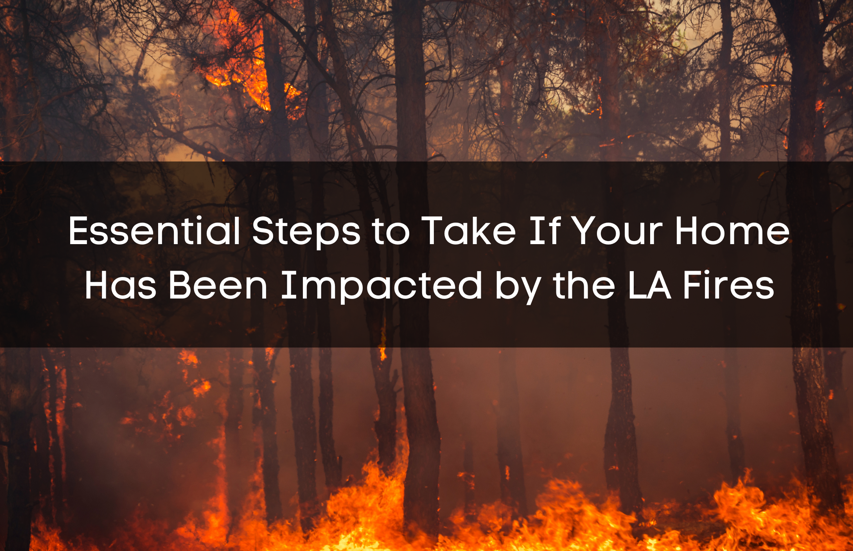
The recent wildfires in Los Angeles are devastating, causing property damage, displacement, and emotional distress. If you find yourself affected by these fires, it’s crucial to take quick action to protect your property, health, and well-being. Here are the steps you should take if your home is impacted:
1. Ensure Safety First
-
Evacuate if Needed: If you’re still in the area and the fire is close, prioritize your safety. Follow evacuation orders and stay in contact with local authorities for the latest information.
-
Avoid Smoke Exposure: If you’ve already evacuated, avoid returning home until officials confirm it’s safe to do so. Smoke can be harmful to your health, so protect your respiratory system by staying indoors and wearing a mask if necessary.
Resources:
2. Reach Out to Emergency Services
-
If you’re in immediate danger or have urgent medical or safety concerns, dial 911 right away. Emergency responders can help you find shelter or assist if you’re stranded. Additionally, relief organizations provide more than just food and shelter—they often have experts who can guide you through legal and financial challenges stemming from a house fire.
Resources:
3. Contact Your Insurance Company
-
Document the Damage: Take photos or videos of the damage if it’s safe to do so. This will be crucial when filing an insurance claim.
-
File a Claim: Contact your homeowners insurance provider as soon as possible to report the damage. Be prepared to provide details about the extent of the fire’s impact and any losses. Your insurer will guide you through the claims process.
Resources:
4. Check Your Property for Hazards
-
Structural Integrity: Only return to your home when it’s safe. Check for structural damage, such as compromised walls, roof, or foundation. Don’t attempt to enter if you suspect there may be electrical hazards or weakened structures.
-
Gas Leaks and Fire Hazards: If you are able to safely return, check for gas leaks and turn off utilities if needed. If you smell gas, leave the property and report it immediately.
-
Debris and Smoke Damage: Assess smoke and ash damage inside the home, which can affect air quality. Consider hiring a professional cleaning service for the restoration of your property.
Resources:
5. Start the Recovery Process
-
Temporary Repairs: If safe, begin making temporary repairs to prevent further damage, such as boarding up broken windows or covering up roof leaks. Keep receipts for materials or services you purchase as they may be reimbursed by your insurance company.
-
Professional Help: Once initial safety checks are done, consider hiring fire restoration specialists to properly clean and restore your home.
Resources:
6. Rebuild and Move Forward
-
Stay Organized: As you begin the long process of rebuilding, stay organized with documentation and work closely with your contractor, insurance provider, and local authorities.
-
Community Involvement: Recovery can take time, but coming together with neighbors and the community can speed up the process. Look into local initiatives to help rebuild the neighborhood and offer support to others.


